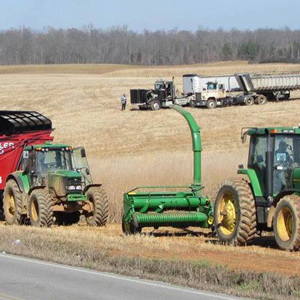Genera Energy showcases commercial biomass harvesting concept

Genera Energy
January 15, 2014
BY Genera Energy Inc.
Genera Energy Inc., winner of the prestigious 2013 Sustainable Biofuels Award for Sustainable Feedstock Innovation, is showcasing some of the most cutting-edge, effective and innovative commercial harvesting techniques available in the biomass industry as it begins its latest harvest of biomass energy crops.
“Genera is laser-focused on researching, developing, field testing and bringing to market the most efficient bioenergy crops, management techniques, harvesting processes and equipment,” said Kelly Tiller, president and CEO of Genera Energy. “This year, we’re expanding our use of state-of-the-art self-propelled field harvesters and innovative ways to handle, move, and store feedstock that can revolutionize large-scale biomass production.”
Developer and operator of the Biomass Innovation Park research development and demonstration campus in Vonore, Tenn., Genera offers advanced industrial scale biomass feedstock supply chain solutions that reduce both the cost and variability of biomass feedstock supply.
Advertisement
Advertisement
Genera’s experts combine their deep understanding of agricultural production and systems with their industrial scale management and logistics experience to provide robust, economical supply chains that balance cost, risk, reliability and quality. That’s important for all of Genera’s downstream biomass customers, regardless of whether they’re using that biomass to produce clean, renewable bio-based fuels, chemicals, power, or products.
“One of the innovations developed by Genera’s biomass experts is a commercially-viable method to bulk harvest biomass crops using existing and new technologies, integrated into our proprietary system,” said Sam Jackson, Genera’s vice president of business development. “For many biomass supply chains, this new system delivers product that offers tremendous savings in cost, time, production, storage and delivery compared to traditional methods.”
Advertisement
Advertisement
According to Tiller, the commercial-scale implications are enormous.“With a number of our biomass customers and downstream partners moving from proof of technology and economics to full scale production in 2014, attention is now turning to the availability, affordability, and sustainability of biomass as a key success factor for this growing industry. Fortunately, Genera’s ahead of the curve and our deep understanding of the industry, real-world experience and successful field testing enable rapid deployment and scale-up of our integrated biomass supply systems,” she said.
Related Stories
The USDA significantly increased its estimate for 2025-’26 soybean oil use in biofuel production in its latest World Agricultural Supply and Demand Estimates report, released July 11. The outlook for soybean production was revised down.
U.S. fuel ethanol capacity fell slightly in April, while biodiesel and renewable diesel capacity held steady, according to data released by the U.S. EIA on June 30. Feedstock consumption was down when compared to the previous month.
The U.S. EPA on July 8 hosted virtual public hearing to gather input on the agency’s recently released proposed rule to set 2026 and 2027 RFS RVOs. Members of the biofuel industry were among those to offer testimony during the event.
The USDA’s Risk Management Agency is implementing multiple changes to the Camelina pilot insurance program for the 2026 and succeeding crop years. The changes will expand coverage options and provide greater flexibility for producers.
The USDA’s National Agricultural Statistics Service on June 30 released its annual Acreage report, estimating that 83.4 million acres of soybeans have been planted in the U.S. this year, down 4% when compared to 2024.
Upcoming Events










